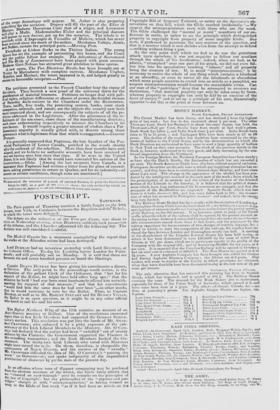In an effusion whose tone of flippant swaggering may be
pardoned from the obvious soreness of the writer, the Globe fairly admits that we "Chanted an easy triumph " over its remarks on the principles of the law of Copyright ; but the philosopher of the " pigeons mid par- tridges." charges us with " misrepresentation," in having treated an ""Y In the Globe of last week "as if it bad been an article on tl:e Copyright Bill of Sergeant Talfourd, or rather on the Spectator's ob- servations on that, hill, which the Globe touched incidentally."—We suspect the misrepresentation rests with those who use the word. The Globe challenged the "mental or moral" soundness of our en- deavour to settle, or rather to see the principle which distinguished property in copyright from property of more tangible kinds. Sao more, it professed to penetrate the very marrow of the question, and that in a manner which it now shrinks even from the attempt to defend —striking without firing a gun. As the only point with which we had to do was the gratuitous attack upon ourselves, it was not requisite to follow our assailant through the whole of his lucubration : indeed, when we had, as he admits, " triumphed " over one part of his attack, we did not even fol- low him into his speculations touching "labour," and all property being the creature of law. If, to avoid "misrepresentation," it be necessary to notice the whole of any thing which contains a falsehood or an absurdity, or even to notice all the falsehoods or absurdities which some people contrive to crowd into an article or a pamphlet, we suspect misrepresentation would become the unavoidable crime. Can our man of the " partridges " deny that he attempted to overturn OUT distinction, "that material property can only be taken away by force, whereas property in copyright can only be held by an exercise of the force of society?" and to set up a principle of his own, diametrically opposite ?—for this is the point at issue between us.






















 Previous page
Previous page